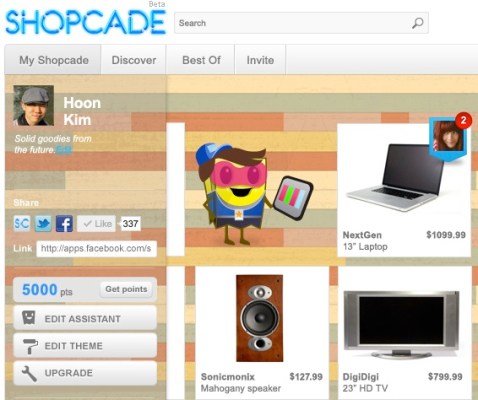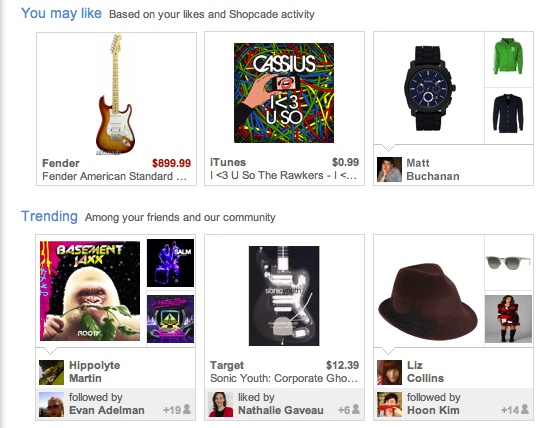We’ve all built up a ton of connections through networks like Facebook and Twitter. Now there’s a way to greedily exchange that social capital for real-world dollars. Shopcade is a new affiliate ecommerce platform where users create a personal store and feature products from a catalog of 40 million item. They can then blast store links to their social networks and earn affiliate kick-backs when their products sell. When used for good, Shopcade helps people structure the shopping recommendations they give friends to aid product discovery, and give to charity. But when used for evil, Shopcade incentivizes social network users to spam their friends.
Facebook has been trying to keep social spammers out. It banned Ad.ly, which connected brands wishing to advertise with celebrities willing to post ads to their fans as status updates. This is because social spam pollutes the user experience at Facebook’s expense. Most people know and loathes someone who uses the news feed to market their small business or promotes events, but most people don’t have anything shill. Paid tweeting services let users earn money for publishing ads, but require tens of thousands of followers to be lucrative.
Shopcade has the potential to give everyone an incentive to spam. Maybe it will help cash-strapped teens avoid crappy summer jobs. But more likely it will degrade the social network experience if it gets popular.
The way the model works is Shopcade aggregates all the affiliate product feeds it can. Users create and customize a personal store and feature products they’d recommend — i.e. that they think their friends will want to buy. When someone buys a product, Shopcade gets an affiliate fee, but then rewards both the store owner and the purchaser by adding a small cash reward to their accounts. Users can cash out through PayPal or by donating their reward to charity. In addition to keeping a portion of the affiliate fees, Shopcade will monetize by selling custom themes and virtual goods that users can display on their stores.
The redeeming property of Shopcade is the product recommendation feed on its home page. When shoppers visit, they’re shown what products their friends are adding to their stores or buying, as well as products based on their own activity and Facebook Likes. These could become a good way to discover relevant products if enough friends are on-board.
From a business standpoint, Shopcade has potential. The 20-person London team was founded by Nathalie Gaveau, who started PriceMinister.com, a French ecommerce site which sold to Rakuten, the French eBay. It also includes an ex-PayPal employee that spearheaded that company’s global expansion. Investors include Ian Livingstone, founder of Eidos Games, and Lord John Birt, Director-General of the BBC.
Unfortunately, from a social good perspective, Shopcade may lower the barrier to affiliate marketing and assist the greedy to exploit the news feed and Twitter stream for low-effort financial gain.

